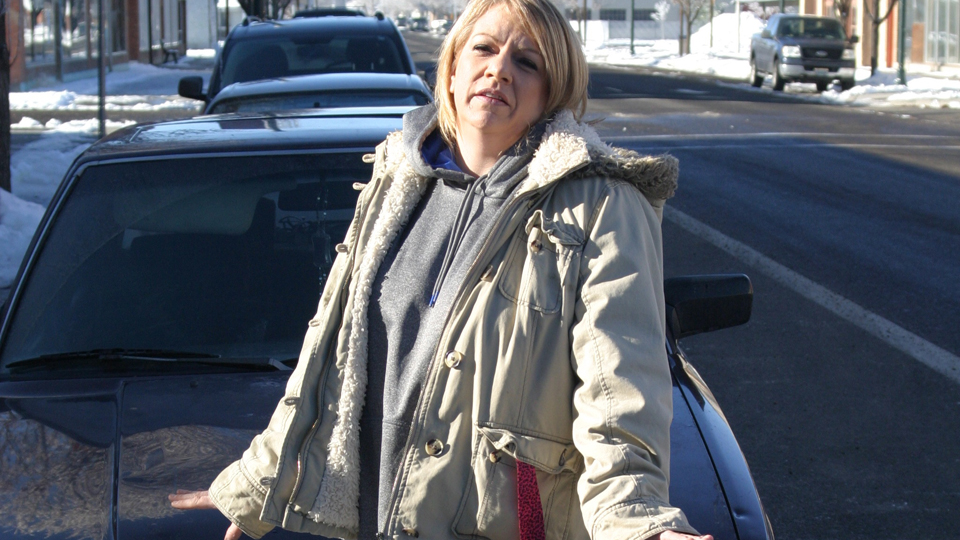
 Jenna Robinson shares the tribulations of being homeless. (Enterprise/Pat Caldwell)
Jenna Robinson shares the tribulations of being homeless. (Enterprise/Pat Caldwell)By Pat Caldwell
The Enterprise
VALE – Now, it is hard for Jenna Robinson to establish just when things were the toughest. Her life has turned around, she said, but not long ago she was locked in homelessness.
It is hard, she will tell you, to narrow down the hardest part of the past eight months.
Maybe it was when she decided to leave an abusive relationship and flee Grants Pass.
At the time, her life to all appearances looked good. She was going to school to become a nurse. She held two jobs.
But she was in an abusive relationship with her boyfriend that was going from bad to worse. She decided to leave, becoming homeless. Eventually she made her way across the state to Malheur County.
Robinson said she came to Malheur County because she learned about Project DOVE, the local organization dedicated to severing the cycle of domestic and sexual violence in the tri-county area. The organization provides shelter, intervention, education and support services for adults and children. Still, while Project DOVE helped, the organization wasn’t able to offer housing.
“I didn’t qualify,” Robinson said.
Yet Robinson felt her best chance to get back on her feet rested in Malheur County.
“I researched it and felt if I am going to get on my feet that is where I will do it,” Robinson said.
Now, a collection of challenges stand like signposts in her memory, Robinson said. When was it the toughest?
Maybe it was when she was living in her car with her 22-year-old daughter, Cris, in the parking lot of the Ontario Wal-Mart.
Or when they traveled last summer from rest stop to rest stop baking in the heat. Robinson and Cris would run the air conditioning at intervals at night to stay cool as they slept in the car.
“That uses half a tank of gas,” Robinson said.
Camping at Bully Creek could be viewed as a bad time too, but Robinson said at least then they had a tent. The small tent marked a milestone for her and Cris. They had a shelter other than their car. So, in a way, things were looking up.
Yet there are also nights and days bathing in rest stop bathrooms and remaining wakeful at night for fear of an intruder. Then the dawn came and presented the mother and daughter with a new – but familiar – set of challenges to solve before nightfall.
Where to sleep?
What to eat?
Where to get the food?
Yet even the worst days carried hope. One day during the summer, overwhelmed by her circumstances, Robinson was in a bathroom at a local McDonald’s on her phone, crying to her grandmother. A woman overheard the conversation. When Robinson ended the call with her grandmother, the woman gave Robinson $40.
Ask her now – as she begins a new job and was finally able to get low-income housing – and Robinson is clear about one thing: Never in her wildest dreams did she believe she would end up “totally homeless,” she said.
Robinson may not realize it but the challenges she and her daughter experienced from March to September are an example of the link between domestic violence and homelessness in women and children. According to a 2010 report in an academic journal, domestic violence is one of the leading factors housing unpredictability.
Robinson’s ordeal is not unusual locally, according Sue Johnson, executive director of Project DOVE.
“They are trying to get away from their abusers and they are basically homeless,” Johnson said.
Johnson said the domestic violence/homelessness problem “seems to be getting worse.”
Robinson was fortunate in one respect: relatives helped with money when they could. Still, the assistance she received from her family was never enough to get over the homeless barrier.
She said she relied on local services – such as Project DOVE, Harvest House Missions and food banks – for food and other necessities.
Robinson also applied for low-income housing as soon as possible but encountered a four-month wait.
Meanwhile, she and Cris used local services and occasional funds from her family while staying in the car and parking at Wal-Mart or local truck stops or RV parks for the night.
“It was horrible, the roughest thing in my life,” she said.
At one point, she returned to Grants Pass. That move, she said, turned out to be a bad idea. She said she visited her former boyfriend to pick up some belongings. The meeting escalated and Robinson was hospitalized, recovered, and left again.
“Ended up in a women’s shelter in Burns,” she said.
At one point the car she lived in – a loaner from a friend – was repossessed. Eventually, another friend gave Robinson a 1986 Toyota Cressida to use.
Robinson said she and her daughter tried to stay positive.
“Things kept happening but we kept on trucking,” she said.
Life began to turn the other way slowly. In September, Robinson was certified to move into a low-income apartment.
“The first night in our apartment we slept on the floor but I was so happy,” Robinson said.
Recently Robinson was hired to work a Logan’s Market in Vale. Things are still not great – her car quit the other night and needs an alternator – but Robinson said she is still grateful.
“From where we were we are rich,” she said.
Johnson said domestic violence and homelessness are subjects that make people uncomfortable.
“People just don’t think it happens here. When you talk to them about it they don’t want to talk about it,” Johnson said.
Yet Project DOVE, Johnson said, remains busy.
“We serve about 300 to 500 individuals and families a year,” Johnson said.
Robinson said she believes it is important people know how quickly a homeless situation can develop.
“It can happen to anybody,” she said.




